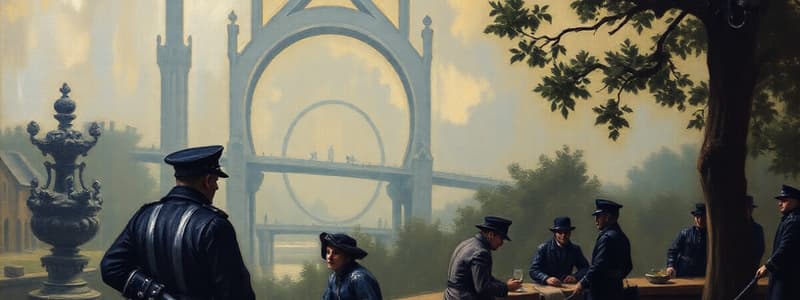Podcast
Questions and Answers
What describes the term 'curtilage' in relation to a residence?
What describes the term 'curtilage' in relation to a residence?
- The interior space of the residence only
- Any open field surrounding the residence
- The yard and buildings surrounding the residence (correct)
- All vehicles parked on the street
Which of the following would NOT qualify as 'seizable property'?
Which of the following would NOT qualify as 'seizable property'?
- Drugs and other contraband
- Evidence of a particular crime
- Abandoned property (correct)
- Unlawful weapons
What is implied by 'reasonable suspicion' in law enforcement?
What is implied by 'reasonable suspicion' in law enforcement?
- Credible and articulable information suggesting an offense may have occurred (correct)
- A hunch based on an officer's personal beliefs
- A detailed investigation with conclusive evidence
- Intuition about a person's guilt or innocence
In what situation would a custodial arrest likely occur?
In what situation would a custodial arrest likely occur?
Which definition best describes 'open field' in the context of law enforcement?
Which definition best describes 'open field' in the context of law enforcement?
Which of the following business establishments can be entered by an officer under the public view rule?
Which of the following business establishments can be entered by an officer under the public view rule?
Under what circumstances can an officer examine merchandise in a commercial establishment?
Under what circumstances can an officer examine merchandise in a commercial establishment?
Which of these scenarios does not involve an act considered to be abandonment of property?
Which of these scenarios does not involve an act considered to be abandonment of property?
Which is a valid exception to the warrant requirement for a search and seizure?
Which is a valid exception to the warrant requirement for a search and seizure?
What is the exception to observing criminal evidence located in plain view?
What is the exception to observing criminal evidence located in plain view?
What does the text say about the requirement of a warrant for blood samples to determine blood type?
What does the text say about the requirement of a warrant for blood samples to determine blood type?
What is the general rule regarding warrantless searches?
What is the general rule regarding warrantless searches?
Under what circumstances can blood samples be taken for D.W.I. without a warrant, according to the text?
Under what circumstances can blood samples be taken for D.W.I. without a warrant, according to the text?
What is NOT a necessary component for a lawful warrantless search?
What is NOT a necessary component for a lawful warrantless search?
Flashcards
Curtilage
Curtilage
An area surrounding a residence, including spaces used for domestic activities like garages, sheds, driveways, and fenced-in areas.
Seizable property
Seizable property
Property that is subject to seizure by law enforcement, including contraband, stolen items, tools used in crimes, and evidence.
Abandoned property
Abandoned property
Discarded property over which anyone can have access, indicating a lack of ownership or privacy interest.
Frisk
Frisk
Signup and view all the flashcards
Probable cause
Probable cause
Signup and view all the flashcards
Warrantless Search
Warrantless Search
Signup and view all the flashcards
Probable Cause to Search
Probable Cause to Search
Signup and view all the flashcards
Exigent Circumstances
Exigent Circumstances
Signup and view all the flashcards
Fruit of the Poisonous Tree Doctrine
Fruit of the Poisonous Tree Doctrine
Signup and view all the flashcards
Extraordinary Search
Extraordinary Search
Signup and view all the flashcards
Public View Rule
Public View Rule
Signup and view all the flashcards
Public Restroom Observation
Public Restroom Observation
Signup and view all the flashcards
Dog Sniff in Public
Dog Sniff in Public
Signup and view all the flashcards
Field Test for Drugs
Field Test for Drugs
Signup and view all the flashcards
Study Notes
16.01 Definitions
- Abandoned Property: Discarded items over which all people have relinquished control and ownership.
- Access Area: Area surrounding an arrestee where they could reach for a weapon or evidence.
- Curtilage: The area immediately surrounding a home, including garages, sheds, and driveways.
- Custodial Arrest: The process of arresting someone and taking them into custody.
- Frisk: A pat down of outer clothing to search for weapons for the safety of officers.
- Open Field: Unoccupied land outside the curtilage of a home with no expectation of privacy.
- Probable Cause: Sufficient facts to convince a reasonable person a crime was committed.
- Reasonable Suspicion: Articulable facts that support a reasonable belief of criminal activity.
- Seizable Property: Illicit items, stolen goods, instruments of crime, and evidence of a crime.
16.02 General Rules
- Officers should obtain warrants whenever possible, but warrantless searches are permitted.
- Search warrants should be obtained for arrests when practical.
- Officers should make valid entries where possible, e.g. to provide emergency assistance.
- Warrantless searches should be made with the least amount of damage.
- Reasonable force is allowed to extract information from an individual.
16.03 Observations Which Do Not Constitute Searches
- Observations in areas with no reasonable expectation of privacy are not illegal.
- Observations in plain view from a valid location are not a search.
- Observing items in open fields or through windows is permissible.
16.04 Probable Cause Plus Exigent Circumstances Searches
- Warrantless searches are allowed if probable cause exists and exigent circumstances make obtaining a warrant impractical, for instance danger.
- Factors supporting probable cause include witness statements, evidence, or detection by law enforcement.
16.05 Consent Searches
- A warrant is not required if consent is given voluntarily.
- Consent must be voluntary and not coerced.
- Consent must be given by someone with authority over the location or item.
- Person giving consent should be advised of their rights.
16.06 Search Incident to Lawful Arrest
- Lawful arrest allows a full search of the arrestee and the area under their control.
- The search must be immediate.
- The search is limited to the area under an arrestee's control.
16.07 Inventory
- Routine inventories of impounded vehicles or property are permitted in certain situations.
- Inventory may not be a pretext for finding contraband.
- Property in plain view during the inventory may be seized legally.
16.08 Emergency Searches
- Warrantless searches are permitted if there's an immediate need to protect safety or prevent destruction of evidence.
- Search must be limited to the area and the reason for the belief.
16.09 Frisk for Weapons
- Officers can conduct a protective pat-down if they reasonably believe a person is armed.
- The frisk must be limited and focused on finding weapons.
- Factors supporting a belief of an armed and dangerous person include circumstances like time of day, location, or witness statements.
16.10 Frisk for Identification
- A limited search is allowed if a person refuses to provide identification.
- The search must be limited to locations where identification would reasonably be found.
16.11 Administrative Searches
- Searches allowed under specific rules or laws are not related to a criminal investigation.
- Examples include searches conducted by school officials or regulatory bodies.
Studying That Suits You
Use AI to generate personalized quizzes and flashcards to suit your learning preferences.




